Heads up: Buying via our links results in us getting a commission (not always, but just about), which helps keep the lights on around here. We also take your privacy rights seriously. Head here to learn more.
About the Author: Adam Terry is a thirtysomething salesman in the construction industry. He enjoys whiskey, watches, boots/shoes, family time, and working on his dad bod father figure.
Here at Dappered, we appreciate good footwear and feel that they are the cornerstone of a well-curated outfit. The right pair of shoes can complete your outfit and help elevate it to another level. Whether that’s the perfect pair of dress Oxfords to pair with your expertly tailored suit, or your favorite pair of leather boots to wear with a button-down flannel and well-worn jeans. Either way, choosing the right pair of shoes for the right outfit can help us look better. When we look better, we feel better. After spending a lot of time and effort researching for that perfect pair of shoes, we then invest our hard earned dollarbucks to bring them home. So, it makes perfect sense that we should also be looking after our investments and making sure that they last as long as possible and maximize the value for our money. Proper shoe care can be divided up into five somewhat related categories – protection, cleaning, conditioning, storage, and repair. Let’s dive in and discuss each layer.
(Side note – today we’ll be discussing basic shoe care routines and products that should cover the large majority of folks out there with calfskin or suede dress shoes, leather boots, basic sneakers, etc. We won’t be covering specialty leather goods made with ostrich, snakeskin, horse/cordovan, etc. as those are more specialized and care tends to be a little more involved. Also, be sure to test new products in inconspicuous spots as some may darken the leather.)
Protect
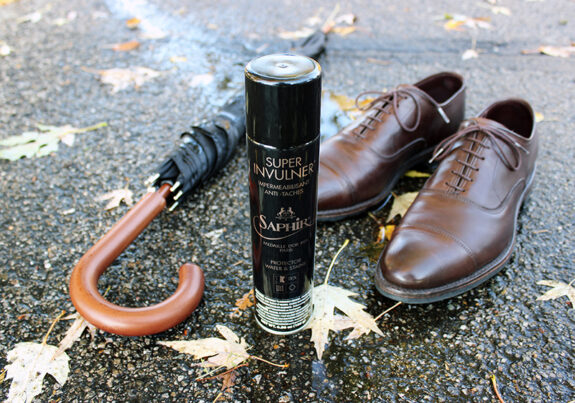
Generally speaking, smooth leather dress shoes and smooth leather boots do not need any pre-adventure protection when they’re fresh out of the box. Leather is a naturally robust material and many of the leathers we encounter are inherently weather resistant thanks to the tanning and finishing processes. With that said, you may want to take some preventative measures if you plan on wearing them in harsh weather conditions, or you want to keep your suede like new.
High quality spray on products like Saphir’s Invulner use resin to create a waterproof layer on top but still allows for the leather to breathe. This is ideal for calfskin, suede, and other high quality or dressy leather shoes (as shown above on a pair of Dappered Editor Joe’s well loved Allen Edmonds Park Avenue Oxfords). For fabric sneakers and rain boots (like L.L. Bean boots), I use Tarrago’s Nano Protector because it includes a hint of silicone in the formula to help repel water. For hikers and hunters who need the ultimate protection against the elements, Saphir’s Everest dubbin grease is great for waterproofing your boots but please note that it may darken the color. And if you’re really heading out there, make sure your boots have the proper insulation and breathable yet waterproof lining (gore-tex). Wet feet = dangerous when it comes to spending real time outdoors.
Clean
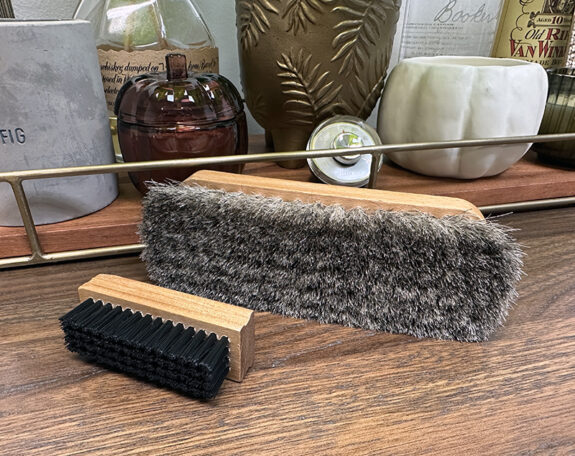
Cleaning your boots and shoes is a simple process that starts with a quick brushing after each wear (editor’s note: or for many of us, maybe not every time… but yes when it looks like they need it.) The goal is to knock off any loose dust, dirt, or other particulates from the day’s adventure before they can become stuck or embedded into the leather. Did you know that dust and dirt can also leach the fats and oils from leather? Given enough time, this can cause the leather to dry out and start to harden and crack, especially in the high stress areas across the vamp. A stiff bristle horsehair brush is essential here. I prefer having at least two brushes on hand – one for black shoes and one for brown shoes – as cross contaminating pigmented cream is not fun.
Generally speaking, you shouldn’t have to deep clean your shoes on a regular basis. However, occasionally you really step in something mucky or yucky and your leather shoes will need to be cleaned with an actual cleaning product. For “normal” intermittent cleaning, Saphir’s Reno leather cleaner is a mild and more gentle formula that will help remove residual waxes without stripping the leather too much. If you need to pull out the big guns to remove excess polish, wax, or other stubborn dirt stains, you’ll want to use something like Saphir’s Reno’Mat sparingly. Note that some cleaners and saddle soap-like products are very drying; you’ll want to follow these up with a conditioner to make sure you’re rehydrating the leather.
For suede shoes and most sneakers, you’ll typically use a mild cleaner and cleaning brush to get deep down between the fibers of the suede or technical fabric. I follow this up with a spray-on protector product as well.
Condition
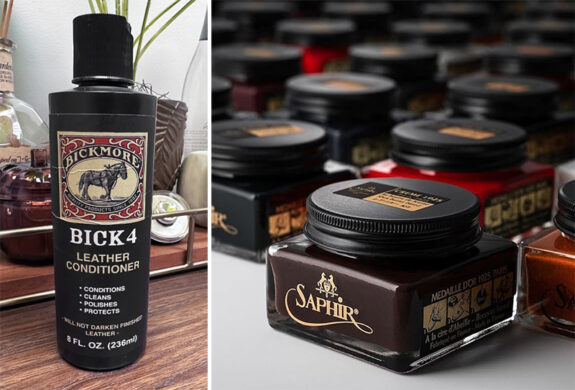
Leather is like your skin – it needs to stay hydrated or it will start to dry out, crack, and fall apart. A good leather conditioner is an essential tool in your shoe care arsenal and it’s important to get the correct kind of conditioner for your specific leather.
- For shoes made with calfskin or smooth leather: A neutral (non-pigmented) conditioner like Bick 4 or Saphir’s Renovateur is a great option.
- If you’d like to impart some color back into a shoe’s leather: Look for a color matching cream polish like Saphir’s Pommadier.
- For shoes made with oiled pull-up leathers like Horween’s Chromexcel: You’ll want an oiled leather cream without waxes to help recondition those leather goods and prevent the pores from getting clogged up.
- Suede is a bit harder to condition… as many conditioning products contain oils or waxes that would otherwise flatten the suede nap. For these pairs of shoes, look for a suede and nubuck spray-on conditioner.
- Performance textile sneakers don’t typically need conditioning products.
(Condition Part II): Conditioning Technique
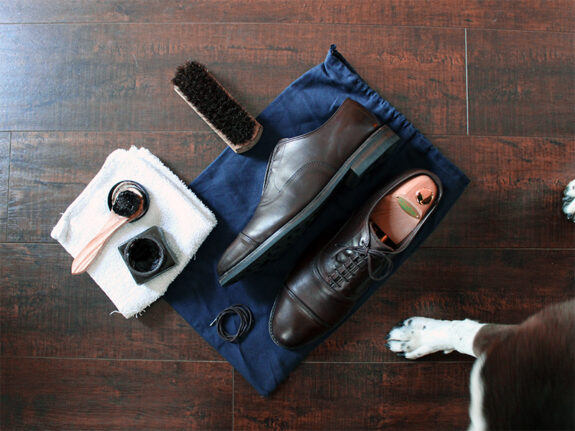
This is a sub-category of category 3, “Condition,” but it’s a necessary point to cover. As far as technique goes, everyone develops their own game plan. Some prefer a less intensive technique (editor’s note: I myself prefer the less-intensive way)… and some prefer to do a little more. There are 8 zillion tutorials on youtube, but
Generally speaking:
- I brush off any dirt or dust from my shoes.
- I use horsehair daubers to lightly apply the conditioner or cream to my boots and shoes because the bristles tend to get down into the panel gaps and welt joints better than an old t-shirt wrapped around your finger.
- I then let the product dry for ~10 minutes
- I then come back and buff it out with a horsehair brush until the leather starts to glow. This can take some elbow grease and pressure.
- If you’d like to achieve a mirror shine, apply some clear or pigmented wax polish now.
That’s really it. Brush them off, apply a little of the conditioner or cream with a dauber, wait for it to dry, brush it off. The end. Everything after that is extra and up to you.
There is no set schedule for how often you should condition your shoes; just keep an eye on the leather and if it starts to look dry or dusty, spend a few minutes rehydrating it and then buff it out.
Storage (trees, bags, boxes, etc.)
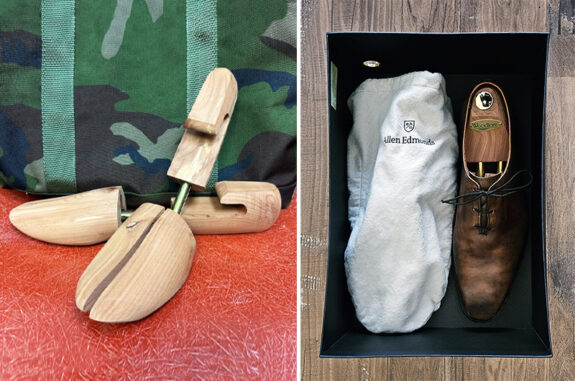
As we mentioned earlier, it’s important to keep dust and dirt away from your fine shoes. Scientists say dust is primarily composed of dead skin cells, dust mites, soil, tiny plastic particles, loose clothing fibers, bacteria, hair, etc. Now, imagine what’s in your closet and you will probably understand that we should be taking better care of our shoes when they’re not being worn. Personally, every pair of shoes that I purchase (not including cheap sneakers) gets a set of cedar split-toe shoe trees and a pair of individual cotton flannel shoe storage bags. (Editor’s Note: And that’s why he’s our shoe expert.)
Cedar shoe trees are used to help keep the uppers from twisting, curling, and shrinking as the shoes dry out. Plus, the cedar wood is antibacterial and can absorb excess moisture and deodorize your shoes. I personally enjoy the smell of cedar, but if you don’t, you can get shoe trees made from beech, maple, ebony, etc. Try to avoid plastic trees unless they’re for travel.
Shoe bags help keep the shoes dry, dust free, and can prevent minor dents and dings during travel. When I travel for work, I usually pack my shoes in my checked bag and we’ve all seen those videos of the bored and underpaid airline workers practicing shot put with a suitcase.
Most of us do not have a closet like Cher in Clueless, so we must take advantage of the space that we have available. I’m a sucker for a well made shoe box because it allows me to store and neatly stack my shoes in my closet to save space. Plus, it’s easy to recognize certain pairs through their shoe boxes (IE: Grant Stone). For the shoes that have outlived their original box, I’m slowly transitioning them over to clear plastic stackable shoe boxes as the budget allows.
Repair
- Replacement heels can cost ~$40-60+
- Full leather resoles can cost ~$100-200+
- Full rubber resoles can cost ~$125-240+
As you’ve seen so far, we’re big advocates for buying well-made shoes and taking good care of them. The next level to essential shoe care is keeping an eye on your shoes over time and watching for any signs that tell you it’s time to stop wearing them because they need a service. It’s always better to be proactive than reactive; don’t let your favorite shoes develop holes or start to fall apart. It’s much easier and usually less expensive to fix these small things early.
Back in May of 2023, I had my ~8 year old Alden longwing bluchers refurbished as they were starting to feel less comfortable as the leather outsole got thinner. I was notoriously hard on these shoes, especially at the heels and toes, so it made sense to get a full resole and add metal toe taps for some extra protection. This type of service extends their life, increases the value that I’m getting out of them, and reduces the overall cost per wear. I think it’s worth it.
(I’d like to thank Grant and Isaac of Unsung House in Nashville, TN for repairing those Aldens and also for helping break down and simplify these shoe care concepts for me. If you have any questions about shoe care or shoe restoration, email them. Thanks, y’all. Cheers!)
https://dappered.com/2023/10/shoe-care-essentials-how-to-care-for-your-shoes-dress-shoes-boots-sneakers/
Did you miss our previous article...
https://manstuffnews.com/men-fashion/10-best-bets-for-75-or-less-cheap-outerwear-good-books-amp-more
 Backyard GrillingWeekend WarriorsAdvice from DadBeard GroomingTV Shows for Guys4x4 Off-Road CarsMens FashionSports NewsAncient Archeology World NewsPrivacy PolicyTerms And Conditions
Backyard GrillingWeekend WarriorsAdvice from DadBeard GroomingTV Shows for Guys4x4 Off-Road CarsMens FashionSports NewsAncient Archeology World NewsPrivacy PolicyTerms And Conditions
